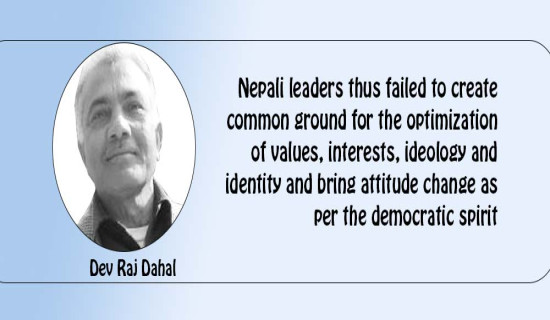- Monday, 3 November 2025
BP’s 110th Birth Anniversary
Visionary Leader, Perceptive Writer
Considered a leading light in Nepal's democratic movement and a revered political thinker, the late Bisheshwor Prasad (BP) Koirala has left an enduring impact on the country's socio-political and literary landscape. His influence extends not only to the followers of the Nepali Congress, the political party he established about 75 years ago, but also to leaders of opposing parties and non-political figures who may not have shared BP's political ideology.
Born on September 8, 1914 (Bhadra 24, 1971 BS) in India’s Benaras City where his family was residing in exile, BP's accomplishments are still remembered on his birthday, particularly by the Nepali Congress. The NC recently held a literary conference to mark his 110th birthday. Surprisingly, a section of the Rastriya Prajatantra Party, which includes pro-royalist leaders and adherents, also called a gathering to review the late BP's contributions, who was known for advocating, besides democratic values and ideologies, the principle of 'National Unity and Reconciliation.'
National icon
For his political and intellectual abilities, BP is largely regarded as a national icon. Many credit him with ensuring political and other sorts of freedom which Nepali people can enjoy even today. As a committed democratic leader, he fought dictatorial influences throughout his life. He led the fight against the despotic Rana Regime and, eventually, the monarchy, successfully overthrowing the Rana rulers in the 1950 revolution. Even after toppling the Rana Oligarchy, BP and his followers in the Nepali Congress confronted considerable hurdles in establishing democratic governance in the country from the then-reigning King.
After a relentless struggle spanning from 1950 to 1958, the monarch decided to organise democratic elections in 1958 (2015 BS), which BP's party won by a landslide, enabling him to become Nepal's first democratically elected Prime Minister. After only 18 months in power, the autocratic monarch of the time, King Mahendra, staged a coup, grabbed power, and imprisoned BP and many other important NC leaders for eight long years. BP went into exile in India for eight years after his release from prison. During this time, he fully developed into a seasoned democratic leader.
During his exile, BP witnessed India annexing Sikkim in 1975 and meddling in East Pakistan (Bangladesh). According to reports, the then Indian Prime Minister Indira Gandhi also exerted pressure on Nepali leaders, raising fears about the country's sovereignty. Despite the risk of being handed the death penalty by the dictatorial king and Panchayat rulers, BP returned to Nepal in 1977 with a message of national unity and reconciliation, emphasising the shared goal of preserving national sovereignty and independence. He then said that while he and the King disagreed on the restoration of democracy in the country, they were on the same page when it came to defending the country's sovereignty and independence.
His return to Nepal energised democracy-loving Nepalis, resulting in a major pro-democracy protest in 1979. The protest forced King Birendra to hold a referendum on whether the kingdom should adopt a multiparty democratic system, as demanded by BP and his party. Unfortunately, the extensively rigged vote resulted in a setback for the pro-democracy movement, allowing the party-less Panchayat system to continue, much to the chagrin of BP, who nonetheless accepted the result to avoid further national unrest and bloodshed. What is notable about this unwavering and towering leader is that he manoeuvred and participated in the 1979 (2036 BS) demonstration while being diagnosed with terminal throat cancer, which claimed his life in July 1982.
Beyond Nepal, BP's appeal has spread to India and the rest of the world. He was inspired by Mahatma Gandhi's Indian independence campaign against British authority. His intimate relationship with India's socialist leaders earned him accolades from a variety of sources and moulded his pro-democratic socialist philosophy. His pro-poor initiatives are still discussed and implemented today. During his tenure as Prime Minister, BP implemented ground-breaking land reforms, pitting him against the landed aristocrats of the time, who were accused of conspiring with King Mahendra to depose him.
His democratic socialism doctrine, which he strove to execute, is still praised by many communist leaders in Nepal. Leaders like Pushpa Kamal Dahal Prachanda, Dr. Baburam Bhattarai and other hardline communists frequently praise BP as one of Nepal's most important personalities, emphasising his democratic values and his principle of national unity and reconciliation as relevant today.
Meanwhile, BP emerged as a pioneer writer in Nepali literature both during and after his lifetime. The majority of his writings were produced during his lengthy and difficult confinement. His novels, short stories, and political thought are required reading for anybody interested in Nepali literature. Novels such as Sumnima, Teen Ghumti, Narendra Dai, Modiain, Madhesh Tir, Atma Britant and Jail Journal, his autobiographical commentaries, as well as short stories like Doshi Chasma and Karnal Ko Ghoda are held in high esteem as masterpieces of Nepali literature. He is the first and predominant writer to experiment Freudian psychoanalysis in his novels and short stories, as well as to comprehensively investigate modern societal thought through the lens of human psychology.
Indomitable spirit
Despite his enormous contributions to Nepal's political and literary arenas, his party, the Nepali Congress, has come under fire for deviating from the established path set by this revered leader. Critics claim that the NC has abandoned BP's concept of socialism, national unity and reconciliation to gain power, instead associating with undemocratic communist groups. While the congressmen claim to support his democratic socialism, they are increasingly adopting free market principles and crony capitalism. As a result, the Nepali Congress has been reduced to the status of a timid partner of communist and Madhes regional parties. According to observers, the NC should maintain its democratic status and abstain from partnering with communists to destroy democratic ideals and spirit.
In conclusion, the life and legacy of BP Koirala exhibit the indomitable spirit of a visionary leader and prolific writer who touched upon the life of a generation he aspired to lead. His persistent dedication to democracy freed Nepal from dictatorship, ushering in a new era of political liberty. Likewise, his creative works benefited Nepali literature by encouraging reflection and modern thought.
(The author is former Managing Editor of this daily.)
How did you feel after reading this news?

















